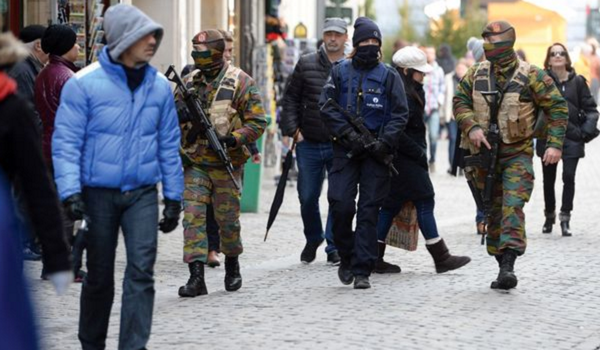|
By Jeff Deist
People of goodwill naturally attempt to make sense of terrible events like today’s bombings in Brussels, to help themselves address the psychological discomfort that occurs when seemingly incomprehensible violence occurs. We have a hard time processing a world where random bombs go off and kill peaceful travelers in airports or subway stations, because it threatens our equilibrium and sense of personal well-being. This discomfort has intensified in our era of 24 hour global news, whereas just a few generations ago our ancestors simply didn’t know about all the trouble in the greater world. The world seems more dangerous today, regardless of whether it actually is more dangerous. Just as politicians and media attempt to create a narrative that explains and influences events, individuals reflexively apply their personal narrative to the world around them. It’s human nature to want reality to comport with our personal worldview or ideology. Needless to say, the news channels today are full of ideological perspectives regarding what should be done. Western conservatives generally advocate a more rigorous prosecution of the “war on terror” as the solution to Muslim terrorism, accompanied by the dilution of civil liberties as needed to assist in that prosecution. Western progressives generally advocate humanitarian aid, open borders, and greater assimilation of Muslims by making countries more tolerant and multicultural (i.e., the same welfare/education/housing arguments they make to address homegrown criminality). Both of these approaches reflect certain inherent biases which are fundamentally incorrect, to put it mildly. Libertarians also stand accused of trying to fit real-world events into their ideology, rather than the other way around. In fact, libertarians are perceived as particularly dogmatic in their anti-state bias — especially regarding so-called public goods. The argument seems reasonable enough, at least on its face: terrorism, and the specter of groups like ISIS, demonstrate the need for coordinated action by governments. But if market failure is the justification for state-provided public goods like security at airports, what is the argument when such state services utterly and predictably fail to protect anyone? Do economists then clamor about “bureaucratic failure” and propose privatization to break up the state’s unnatural monopoly on police and intelligence services? On the contrary, nobody blames government agencies or government police when terrorist acts are not thwarted. If anything, state actors are rewarded with increased budgets, personnel, and powers when horrific things happen on their watch. After the 9/11/2001 attacks in New York, for example, whole new federal agencies and departments were created. Federal intelligence agencies were vastly expanded. State and local police went on buying sprees for new militarized equipment. The point here is not to blame anyone other than the actual malefactors involved in Brussels. Islamic terrorism is a very real problem, but so is American and European foreign policy. The point is that conservatives think “liberal” policies (soft on crime and foreign policy) lead to terrorism, while the Left thinks “conservative” policies (cultural intolerance and aggression) lead to terrorism. But there is one policy that all governments everywhere share: the policy of not allowing markets, including markets for security, to operate freely. If allowing markets to operate represents an “ideology” to most people, so be it. I would argue that markets represent a lack of ideology. More importantly, markets provide far and away the most practical approaches to difficult problems like terrorism. It is conservatives and progressives, in fact, who are the dreamers: no matter how many times governments fail to prevent terrorism, the same tired policies are revamped and the same tired state apparatus are “reformed.” A more libertarian approach requires no great change of public opinion or politics, just a willingness to begin privatizing security at a few airports, train stations, and the like. Crime and violence exist in every society. The goal is to minimize crime and violence within the framework of available resources and at a reasonable overall cost, economic and otherwise. Governments are uniquely ill-suited to provide competent security services or prevent terrorist attacks for the same reasons they are ill-suited to provide housing, food, or medical care: they cannot rationally calculate costs vs. benefits. They are also hopelessly bureaucratic and completely political in everything they do. They are process-oriented rather than results-oriented. Only private actors, with their own money at risk, can provide the “appropriate” (i.e., market) level of security in any given environment. Only private property can be properly protected, surveilled, and insured by self-interested owners. Only private actors worry about bottom-line market share and business reputation. Only private actors, including airlines, are fully subject to an imperfect but extant system of tort liability. Only an insurance model, where private actors directly bear the costs of their action or inaction, can provide the proper incentives and align the interests of security providers with those being protected. In short, only private actors have all of the right incentives to keep people safe. Free markets aren’t perfect, because they merely reflect the imperfect actions of human beings. Free markets can’t create utopia, or a world free of risk and violence. But airport and transportation security can be vastly improved, with a better bottom line: more people making it home safely. When we offer an alternative to grossly incompetent and sclerotic state bureaucracies in providing security to high-crime areas, conditions improve. And that’s the real goal of libertarian “ideology”: a better world, not a perfect one. This article was originally published at The Mises Institute. Comments are closed.
|
Archives
July 2024
|



 RSS Feed
RSS Feed



